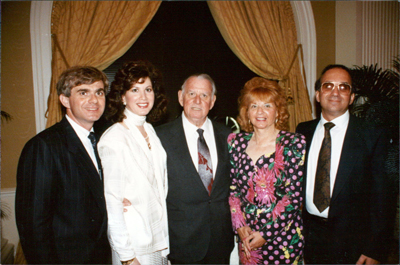 Many families have their own set of traditions. Whether it is a secret recipe, a trip to a special location, or a favorite song, these unique customs live on from one generation to the next.
Many families have their own set of traditions. Whether it is a secret recipe, a trip to a special location, or a favorite song, these unique customs live on from one generation to the next.
For the Schwartz family, their tradition is philanthropy. The late Corrine and Joseph Schwartz were major donors to hospitals, schools, and museums in Baltimore and around the world.
Some of their most significant gifts were made to the University of Maryland Medical Center (UMMC), having been inspired by Dr. Mort Rapoport, the former CEO. They named the Joseph and Corinne Schwartz Division of Transplantation at UMMC and the Schwartz Stroke and Brain Injury Center at Kernan Hospital, now the University of Maryland Rehabilitation & Orthopaedic Institute.
Even after Joseph passed away in 1999, Corinne— affectionately known as ‘Peachy’—continued their legacy of giving and supported the University of Maryland Children’s Hospital in her final days, leaving a significant bequest to the Children’s Heart Program in 2018. The couple’s longtime support of UMMC and belief in philanthropy now lives on through the generosity of their children and grandchildren.
“My dad once told me he gave to thank others for his good fortune. He wanted to give back,” recalls Richard Schwartz, son of Joseph and Peachy. “My mom had a favorite expression. ‘She lived to give.’ She just wanted to help people have an easier life.”
Richard continues his parent’s legacy through his support of the University of Maryland Children’s Hospital and the R Adams Cowley Shock Trauma Center. In 2014, Richard received a tour of the mockup of the Drs. Rouben and Violet Jiji Neonatal Intensive Care Unit (NICU). He was impressed by the new space, state-of-the-art technology, and advanced patient care experience.
“As soon as I walked out of the mockup unit, I knew I would be a part of your effort to save these little miracle babies,” he says.
In the NICU, Richard named the Family Consultation Room and an individual patient room. He also established the Richard Schwartz Neonatal Research Fund, which he supports regularly. While asked to join the Children’s Hospital Board of Advisors on several occasions, Richard prefers to stay behind the scenes. He has since become a trusted advocate and a valued sounding board to the children’s hospital.
Richard is also passionate about trauma and critical care. In 2014, he named the Nurses’ Station in the Shock Trauma Critical Care Tower in memory of his sister, Roslyn, and in honor of his niece, Dr. Beth Hochman, a trauma surgeon. He has also given generously to the Shock Trauma Area of Greatest Need Fund.
“Because of my dad and mom, I feel a need, desire, and a want to give to help others for all that I have been given. I must carry on their legacy,” says Richard. “It’s not exactly equivalent, but Spider-Man was told that with great power, comes great responsibility. I feel an overwhelming responsibility to help others and make this world a little better place.”
Richard’s sister, Marcia Hochman and her husband, Harry, also carry on the family’s legacy of giving to UMMC, supporting both the medical center’s greatest needs and groundbreaking research in the use of immunotherapy led by Dr. Aaron Rapoport at the University of Maryland Marlene and Stewart Greenebaum Comprehensive Cancer Center. Marcia notes that the end-of-life care that both she and her husband’s mothers received at the University of Maryland has left them with a huge sense of gratitude and appreciation.
“Our parents modeled generous charitable giving throughout their lifetimes, so it is natural for us to practice that in our lives. Furthermore, as Jews, we have an ethical obligation to help our communities and to give to charity, which is the meaning of the Hebrew word, Tzedakah,” explains Marcia. “It also provided an opportunity to introduce our children to the importance of generosity—that they can make positive changes in the world and will hopefully carry on what our family has started and support charities for years to come.”